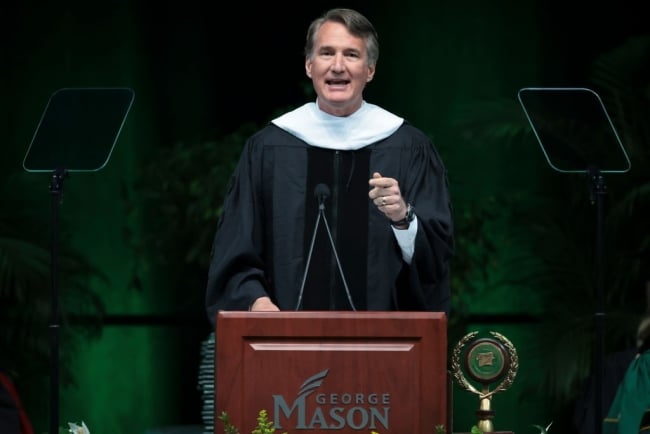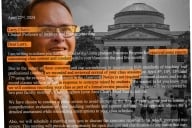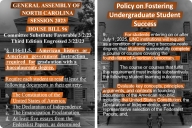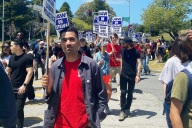You have /5 articles left.
Sign up for a free account or log in.

Virginia governor Glenn Youngkin gave the commencement address at George Mason University in May.
Win McNamee/Getty Images North America
Republican politicians have targeted diversity, equity and inclusion in state after state. They’ve passed laws to limit, defund or outright ban related programs. They’ve demanded information on universities’ DEI expenses and their numbers of DEI positions.
Virginia governor Glenn Youngkin, a Republican who won office in 2021 after campaigning against the alleged teaching of critical race theory in K-12 schools, is diving into the details. His education secretary’s office has requested to review syllabi from upcoming diversity-themed courses at two public universities: George Mason, which has been planning a broad “Just Societies” mandate, and Virginia Commonwealth University, which has been planning a new “Racial Literacy” requirement. The universities say they have complied with the unusual requests.
Kristin Reed, assistant professor in the focused inquiry department at VCU and co-founder of VCU’s chapter of the United Campus Workers union, called Youngkin’s request to scrutinize just these courses a “targeted attack” on teaching about race and racism. “I have seen how these culture wars play out in K-12 education—they start with these symbolic gestures and they lead to book banning and censorship and the firing of teachers,” Reed said.
Faculty members at both institutions have been planning for years to launch the requirements for new undergraduates, and were hoping to do so this fall. Now, some worry that Youngkin’s requests may be a prelude to violations of academic freedom and shared governance that will quash the new criteria. Youngkin’s first executive order as governor was to root out critical race theory and other “inherently divisive concepts” from public K-12 schools.
At George Mason, a few Board of Visitors members have pushed back on the requirement. The implementation of a racial literary class requirement at VCU was already in question.
Melissa Broeckelman-Post, a communication professor and the George Mason Faculty Senate president, was more measured than Reed, telling Inside Higher Ed “a lot of folks get nervous when there’s a lot of scrutiny placed on syllabi.” She noted that “the board has broad oversight,” but said “the details of the curriculum really should be left to faculty.”
In response to an interview request and emailed questions—including what the governor plans to do with information gleaned from the syllabi—Youngkin spokesman Christian Martinez emailed Inside Higher Ed a one-paragraph statement. “The administration has heard concerns from members of the Board of Visitors, parents, and students across the Commonwealth regarding core curriculum mandates that are a thinly veiled attempt to incorporate the progressive left’s groupthink on Virginia’s students,” it said. “Virginia’s public institutions should be teaching our students how to think, not what to think and not advancing ideological conformity.”
George Mason and VCU have separate boards. Martinez didn’t respond to a follow-up question regarding which university the statement was referring to—or whether it was referring to both.
It’s now in doubt whether either university will move forward with its requirement. Reed, a full-time nontenured faculty member, said Youngkin’s request—combined with VCU’s cutting of positions for next academic year—paint a bad picture for academic freedom.
“Anytime you have mass firings, unilateral reduction of contract length—so a significant increase in faculty precarity—alongside hostile state scrutiny, what you have is an environment of a very high level of fear where free speech, both in the classroom and in research, really isn’t possible,” Reed said. “It’s just an environment of extreme fear, and I believe that it’s been constructed that way deliberately.”
A Diversity Dream Deferred
At VCU, faculty members and students have been working for years to implement a requirement that undergraduates take a course on racial literacy. Mignonne C. Guy, an associate professor and former chair of the university’s African-American studies department, said the push came out of, among other things, discussions with students during the pandemic shutdowns in the wake of the murders of George Floyd and other African Americans.
But last July, less than a month before the mandate was to take effect for the fall 2023 semester, the university announced a delay. Fotis Sotiropoulos, VCU provost and senior vice president for academic affairs, told employees that only two courses had been created to meet the new requirement; another university official wrote that they couldn’t “offer the class seats needed to meet the annual demand of more than 4,000 first-year students.”
At the same time, VCU was cutting positions in its focused inquiry department, which teaches new students core skills. Those positions could have helped meet the demand.
Guy told Inside Higher Ed in August that she thought VCU would never implement the requirement. But faculty members pressed on, crafting additional courses to meet the need. About a month ago, the university did post an update online discussing progress, but still with no guarantee that the requirement would take effect this fall, or at all.
“If the total number of available seats across all course sections meets the requirement set last October, then we can move forward,” the update said. It said there could be 17 total courses, but it didn’t clarify whether that would provide the required number of seats.
While creating courses may allow for implementing the requirement, it could also be its undoing. The syllabi for these new classes could provide more ammunition for DEI opponents.
In response to a request from the education secretary, VCU provided syllabi for 11 courses already approved, along with a March 1 letter to the education secretary along with the syllabi. The university did not answer written questions or provide an interview.
The goals on multiple syllabi include learning how to push back against systemic racism, and they include other DEI- and activism-associated language that may draw conservative ire.
The syllabus for Colorism in Society says, for instance, that “we will push back on societal norms by exploring possible ways to disrupt the systematic discrimination that colorism creates.” The one for Race and Racism in the United States says completing students should be able to demonstrate “approaches and strategies to disrupt and dismantle systemic racism.” Among the learning objectives for Reading Race is demonstrating "engagement in individual and collaborative critical and creative problem-solving that can foster potential strategies for disrupting systemic racism.”
The United Campus Workers’ VCU chapter excoriated Youngkin for the state request, and the university for providing them. “We see this compliance—without timely notification or open discussion among the students who requested and began this initiative or the VCU faculty body—as the latest of a series of attempts to kill the implementation of the Racial Literacy curriculum requirement,” the union said in a news release.
On Friday, Guy said she "never believed that they [VCU] would implement this requirement" in the first place. She added that she's "seriously concerned that there are individuals within the state government—not professors, not individuals who are trained in these fields ... that are controlling and dictating the curriculum for adult students at an institution of higher education.”
Whether racial literacy becomes a requirement in the fall remains unclear.
Board Backlash
Starting this fall, George Mason has been planning to require new undergraduates to take two courses designated with a “Just Societies flag.”
The flag means the university has confirmed that the courses teach diversity-related skills along with their main material. George Mason’s website lists 21 flag-bearing courses from wide-ranging disciplines. Among them are “Peoples and Cultures of India,” “Scientific Racism and Human Variation,” “Modern Architecture,” “Grand Challenges to Human Security” and “Introduction to Lesbian, Gay, Bisexual, Transgender, and Queer Studies.”
Broeckelman-Post said Just Societies evolved out of a former university president’s 2018 call for a single required course on DEI and wellbeing. But over time it became “something that is infused in what we do already,” she said, and “we wanted to give more flexibility and more choice all around.”
The flag is placed on GMU courses that, atop teaching students about the course’s academic discipline, provide them two additional skills: being able to define and communicate using "key terms related to justice, equity, diversity and inclusion" in the academic discipline, and being able to "articulate obstacles to justice and equity, and strategies for addressing them" in the discipline.
“It has become essential for employees and citizens to be able to interact effectively with others from all walks of life,” especially given increased societal polarization, the website says. It says George Mason defines diversity to include not just racial diversity, but diversity in gender identity, socioeconomic status, religion and more.
The university was progressing toward implementation when, in January, outside scrutiny ratcheted up. On Jan. 23, according to a university spokeswoman, the state’s deputy secretary of education responsible for higher education called “after seeing social media attention about the new fall 2024 core requirement and related courses.” The spokeswoman wrote in an email to Inside Higher Ed that 16 "approved syllabi" were shared.
A little more than a week after the call, The Chronicle of Higher Education reported that Keith D. Renshaw, an associate provost for undergraduate education, wrote to a faculty member that the deputy secretary and George Mason’s own Board of Visitors had requested their syllabus and others like it. Less than a month after that, a few George Mason board members expressed concerns about the new mandate at a public meeting.
Youngkin has appointed eight of the board’s 15 members, according to bios on the university’s website. Out of the Youngkin appointees, at least four are affiliated with conservative organizations that repeatedly criticize or oppose DEI: the chief of staff for the American Council of Trustees and Alumni; the director of the Heritage Foundation’s Center for Education Policy; a senior adviser to the Heritage president; and a nonresident fellow at the American Enterprise Institute. It’s unclear which, if any, expressed concerns to the Youngkin administration about Just Societies.
“I think that this has gotten caught up in a fury of words with a lack of understanding,” Renshaw told board members. “It literally points to the need for this kind of education.”
Board member Charles (Cully) Stimson, the senior adviser to the Heritage Foundation’s president, was the most critical of Just Societies. He told Renshaw at the public meeting that the requirements “should all be pulled out root and branch and they should focus on the core subject itself instead of airdropping these socially divisive things into core subjects.”
DEI is “inconsistent with the Chicago Principles,” Stimson said. That’s a reference to the University of Chicago’s widely adopted, decade-old campus free expression statement that says, among other things, that “concerns about civility and mutual respect can never be used as a justification for closing off discussion of ideas, however offensive or disagreeable those ideas may be to some members of our community.”
Stimson then said the “Ibram X. Kendi thing is a hoax,” referring to the Boston University professor who wrote How to Be an Antiracist and other works.
Renshaw had spoken about competing definitions of equity and the need for instruction to provide students a common understanding of terms. Stimson said he believed George Mason defines equity as “equality of outcome,” a definition he disagreed with.
Reginald (Reg) Brown, a Youngkin appointee who worked in the George W. Bush administration, expressed skepticism about the Just Societies requirement. He asked whether the faculty and others recommending it were willing to “slow this down” or even “delay for a semester.” Renshaw said that wasn’t his decision, but up to a larger faculty committee, and pushed back, saying the university had been working toward this for years.
Jeffrey Rosen—another Youngkin appointee, an AEI fellow and a former acting U.S. attorney general who resisted Donald Trump’s efforts to overturn the 2020 presidential election—backed Brown up. Brown then argued the board has ultimate power over this curricular issue, saying at one point that the “board can fire anybody.”
The discussion ended on a cliffhanger. The board appointed a new committee that is talking about next steps for Just Societies. Broeckelman-Post, who sits on the board as faculty representative, said she’s on the new committee alongside two other board members (one who’s yet another Youngkin appointee, and one who was appointed by Youngkin’s Democratic predecessor). There are also a few administrators, Broeckelman-Post said.
The university said there will be an update on the fate of the requirement in May.







